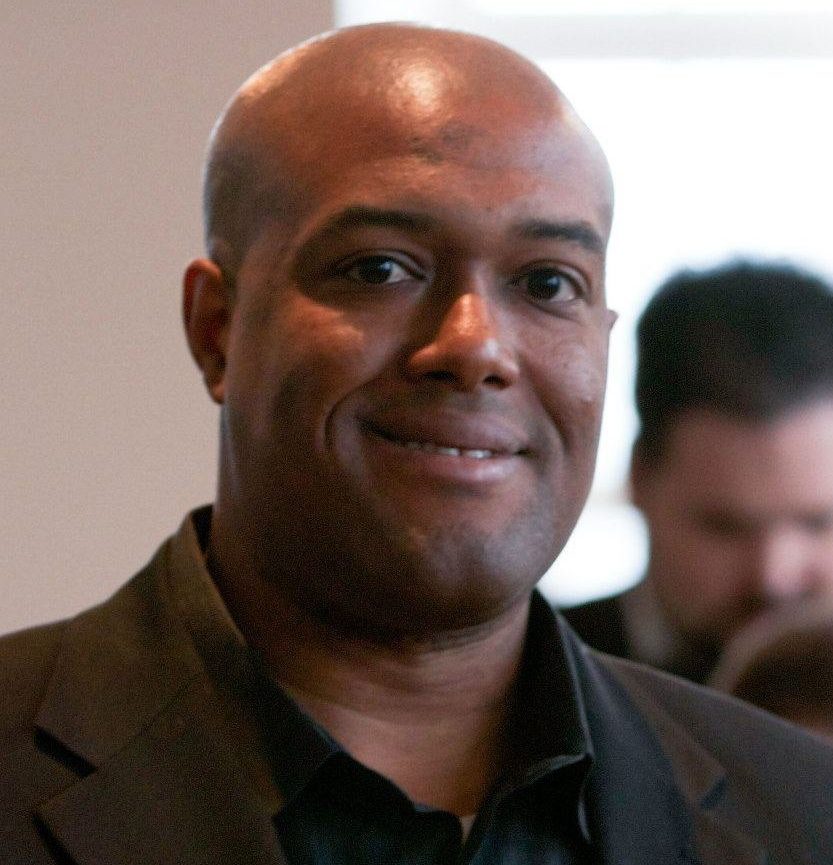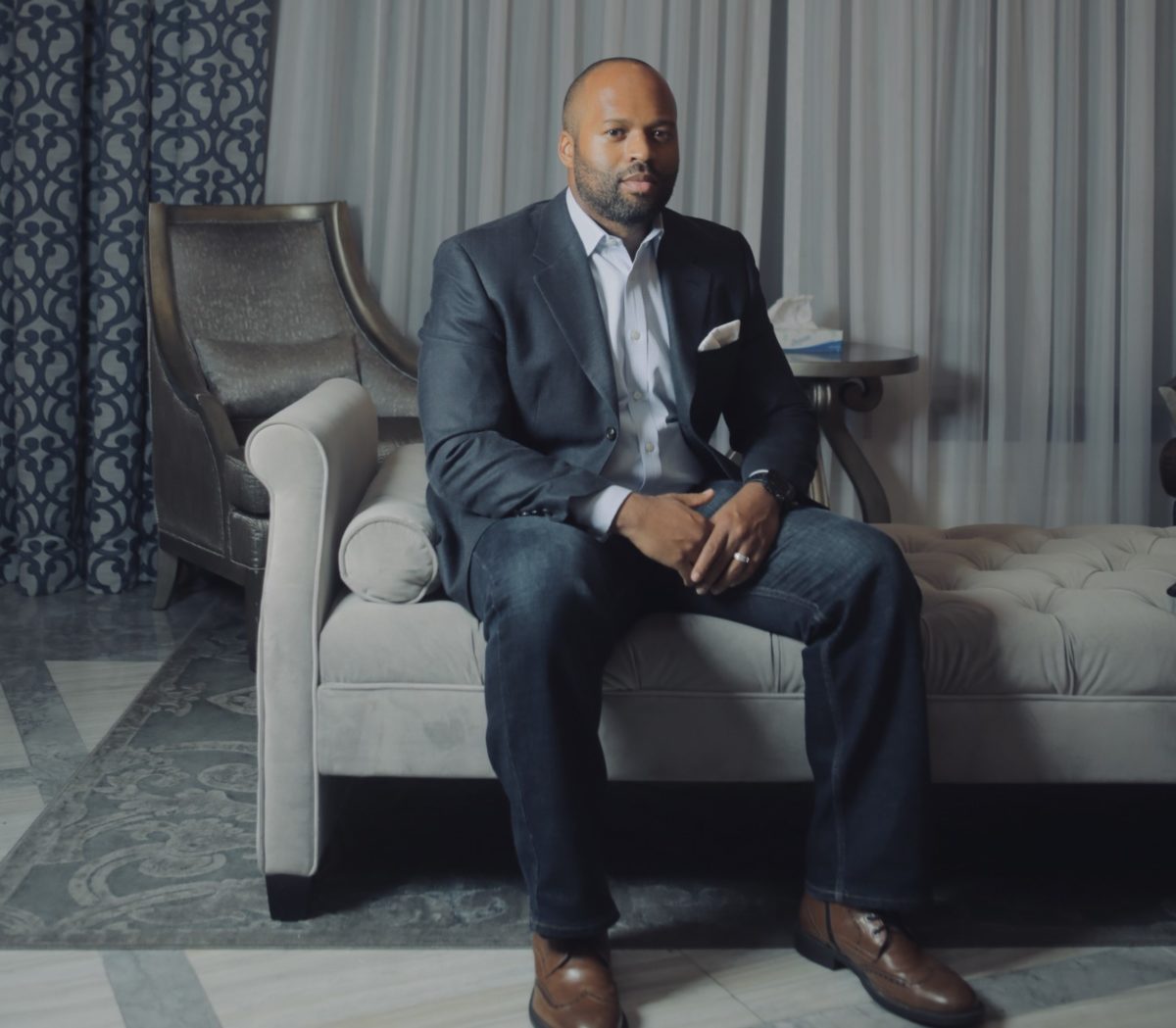
This report is part of a multi-market, data-driven series on how tech economies are growing wealth in U.S. cities. See an explainer on the data behind this reporting.
Pedro Moore is one of a rare, but growing breed: a Black professional in the venture capital industry.
He cut his teeth under the late Delaware investor David Freschman, a managing partner of Innovation Ventures and the Delaware Innovation Fund, and the founder of FashInvest.
“He’s the one who taught me the game,” Moore said, connecting the then-fledgling VC with his most famous client as an advisor — Daymond John of “Shark Tank,” himself a VC and the founder of FUBU.
When it comes to building wealth, who you know — and what they teach you — is possibly the most vital factor. That’s especially true when inherited wealth is off the table, as it is for many Black Americans. Not everyone has a Freschman to guide them, so Moore offers his advice on investing and building wealth freely whenever the opportunity arises, with a focus on those who are under-resourced, underrepresented and often left out of the prosperity loop.
Challenges remain. Yet slowly, Black wealth is growing in Delaware.
According to U.S. Census PUMAs data compiled and analyzed by Technical.ly with the help of a local data journalist, the number of Black Delawareans earning at least $200,000 a year — the income needed to become an accredited angel investor — more than doubled between 2009 and 2019. (Check out the methodology via GitHub.)
Don’t get too excited yet: The percentage of Black Delawareans earning $200,000 or more per year is still less than 1% of the state’s Black population. In raw numbers, 580 Black Delawareans, or 0.3%, fit into that high earning category in 2009; in 2019, that number boomed to 1,545, or 0.73%.
Meanwhile, the percentage of white Delawareans who make $200,000 or more per year was 1.51% in 2009 and 1.84% in 2019. Delaware’s Asian population is its highest earning, at 3.07% (up from 1.91%), while the Latinx population has the lowest percentage of high earners, at 0.18% (up from 0.14%).
In short, while the Delaware’s Black population has yet to crack 1% in number of $200,000-plus earners, it is the racial group with the most growth over the past decade.
Here’s a look at what percentage of the population is making more than $200,000:

(Graphic via Resolve Philly)
There could be many factors leading to this jump, from youth workforce development programs and college preparatory cohorts aimed at Black and brown students to initiatives like the expansion of HBCU Delaware State University that support the continued growth of Black high earners in the state. At the same time, there are structural challenges that remain that are just beginning to be overcome.
How Black Delawareans have built wealth
According to Technical.ly’s data, the top industries for jobs that pay $200,000 or more annually in Delaware include healthcare; management, scientific and technical consulting services; finance; law; and construction. (Computer systems design came in at #10 in a ranking, with 3% of 2019’s high earners working in the field.) This data doesn’t account for race, so we don’t know who is represented within these high-earning occupations. But anecdotally, those industries are also some of the the highest paying for Black Delawareans specifically, Moore said.
That includes STEM and biotech, along with “consumer products, the franchise space, service-based businesses, transportation, commercial cleaning and investment,” he said. “Home services has done really well, too. People at home because of COVID-19 would see that there home was falling apart, so they hired someone to fix it.”
However, business ownership, more than a paycheck, is a better foundation for building wealth that lasts for generations, Moore said.
Ayanna Khan, founder and president/CEO of the Delaware Black Chamber of Commerce (DEBCC), is immersed in the state’s Black-owned businesses. A small, informal poll conducted for Technical.ly suggests, unsurprisingly, that DEBCC members are wealthier than the general Black population of Delaware: 13.63% (or three of 22 respondents) disclosed that they make over $250,000. What do they do? Khan cites a member who owns several daycare centers in the state, as well as successful contractors.
Building new networks
When it comes to who gets to build and invest wealth, the “old boys” network that disadvantages people of color and women has remained powerful for centuries, but things are starting to change. Dr. Dan Young, director of the Doctor of Business Administration Program at Goldey-Beacom College, is a Black educator committed to increasing the number of Black doctoral candidates and professors. He, obviously, agrees that entrepreneurship can be a path to wealth creation.

Dr. Dan Young. (Courtesy photo)
While an MBA can quickly increase a corporate employee’s salary, a DBA helps entrepreneurs run their own businesses more effectively. It doesn’t come with the same immediate jump in pay, Young said, but in the long-term, it can be a path to creating generational wealth.
“One of the major things that a DBA does for you is it allows you to be a more effective business owner, so we’ll have classes in things like contemporary organizational strategy, integrated management, human resources, supply chain management, stuff like that,” Young said. “A lot of the people in the program are already doing pretty well, they’re just trying to get a little bit better.”
And while large corporations like banks are increasingly investing in a racially diverse talent pipeline, new technology industries may allow for more access to the table than older ones.
“Crypto, cannabis, cybersecurity — all these are technologies that are in their infancy, so if I show up at work I may not be as subjected to the old boys network,” he said.
The network gap
Once someone reaches the angel investor threshold, be it through entrepreneurship or a salary, their investment journey doesn’t automatically begin. Certainly not everyone who makes $200,000 wants to take the chance at further growing their wealth by investing it back into the startup ecosystem — but some might, while lacking the knowledge of how to do so.
For those Black residents who have achieved a high income, the playing field isn’t always level when it comes to info. Moore sees it happen in the investment sector a lot.
“There are a lot of [Black] folks that have an interest in investing, are excited about it,” he said. “However, there’s of lack of understanding and information.”

(Graphic by Sabrina Vourvoulias)
After he was pictured in an article about Delaware angel investors, he was approached by a Black couple from downstate, both doctors who own commercial real estate. They wanted to learn how to invest in Black and brown startups, and weren’t aware that they were, simply due to their incomes, already accredited investors.
“Some people may not even know that they can invest. Some don’t even know what an accredited investor is. They may not know that they can participate due to perceptions,” Moore said. “Another thing that people think is that there is a certification process. No — if your bank account meets the income [minimum], it checks the box.”
Why do Black professionals, even those with multiple degrees, lack wealth-building information that others seem to have?
“I think it’s network access,” Moore said. “It happened with me. There are even some [Black] celebrities who qualify to be accredited investors but they don’t have the network to get access to quality deal flow. It’s a network gap. You don’t even necessarily need a ‘seat at the table’ — but you at least need access to people at the table.”
Finding new ways to invest
Sometimes, the status quo has to be bucked by Black high earners if they want to use their wealth to invest in up-and-coming Black businesses. Garry Johnson III saw an opportunity to do that with the November 2020 passage of Regulation Crowdfunding (Reg CF): The SEC rule change allows companies to raise up to $5 million from investors on crowdfunding sites where anyone can participate, up from the previous $1.07 million cap. It was established in response to use of platforms such as Kickstarter and Indiegogo.

Garry Johnson. (Courtesy photo)
Johnson is the founder of the First Founders Accelerator, a program aimed at underrepresented startup founders like himself. First Founders is an early adopter of the Wefunder City Partners program, where it goes by the name PhilaDelaware. Wefunder, a crowdfunding platform explicitly for startups, took Reg CF and ran with it. Unlike Kickstarter, where funders may receive “perks” (often an early run of a product in development), funders on Wefunder are full investors with equity that can lead to gains or losses, depending on the startup’s success. All you need is $100 for a minimum investment, though Reg CF allows for high-dollar investments as well.
“It’s not meant to take the place of VC,” Johnson said. “It sometimes can, but it also can help set startups up for VC.”
For low-income founders, crowdfunding seed funding can take the place of what is commonly called the “friends and family” round that precedes approaching an investor for VC funding. Not having generational wealth where one can ask family and members of their family’s network for a substantial amount of seed funding has historically been a huge roadblock for founders of color. At the same time, community members investing smaller amounts to startups in the community for equity wasn’t a viable option before.
Beyond entrepreneurship
Wealth generation is about more than starting a business and working yourself to the bone.
“I feel like we in the Black community say that entrepreneurship is a path to wealth, but what happens is, I think, that we check that entrepreneurship box off if we become independent sole proprietors,” Moore said. An estimated 95% of Black-owned businesses in the U.S. are sole proprietorship or partnerships which have no paid employees. “Actually, you are less likely to earn higher wages when you are self employed, compared to even just being an employee.”
The narrative, he said, is starting to favor ownership over entrepreneurship alone — that is, growing something scalable that you can sell for a big payoff.
For Black Americans, that way of looking at business can be culturally challenging, he said.
“I think what happens is, we were trained historically to work hard at everything and be the best we can be. That’s been programmed in us — and I’m including myself in this. Subconsciously we don’t want to bring anybody else in because we want to make sure we’re doing the best, but in reality, you want to find people that are better than you. It’s fine to start out with just yourself, but we need to learn to start firing ourselves and bring in others who can add value,” he said. For instance, “for the soul food restaurant, do you have to be the one cooking all the time, or could you be the one who builds the team and figures out how to franchise that restaurant all across the U.S.?”
Ultimately, Moore sees owning businesses that can scale, and then investing in such businesses, as the path to increased Black wealth, even more so than buying a home or simply holding down a well-paying job.
“Don’t program us to get a house to close the wealth gap,” he said. “Tell us the real path to get there, or give us the opportunity to get there — and it really is ownership and equity.”
_
This is the first in a series on how tech economies are growing wealth in U.S. cities, and we need you to be part of it. What do you know that we don’t, or what do you think we need to come to understand about the topic? Email Technical.ly CEO Chris Wink at chris@technical.ly or Technical.ly Managing Editor Julie Zeglen at julie@technical.ly if you have any questions, additions or thoughts.
Join the conversation!
Find news, events, jobs and people who share your interests on Technical.ly's open community Slack

Delaware daily roundup: Early-stage loan help; Jobless rate drops below 4%; $700k grant for industrial park

Delaware daily roundup: Greentech terms to know post-Earth Day; generative AI's energy costs; anti-AI deepfake legislation

Delaware daily roundup: Delmarva Power vendor stats; DelDOT's $15M federal grant; 50 best companies to work for


